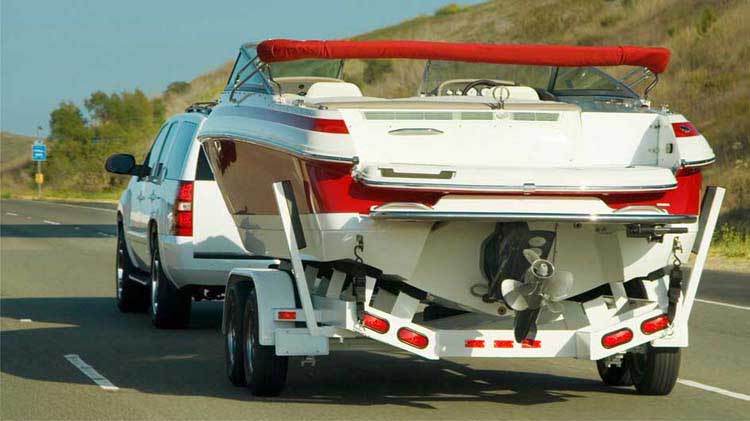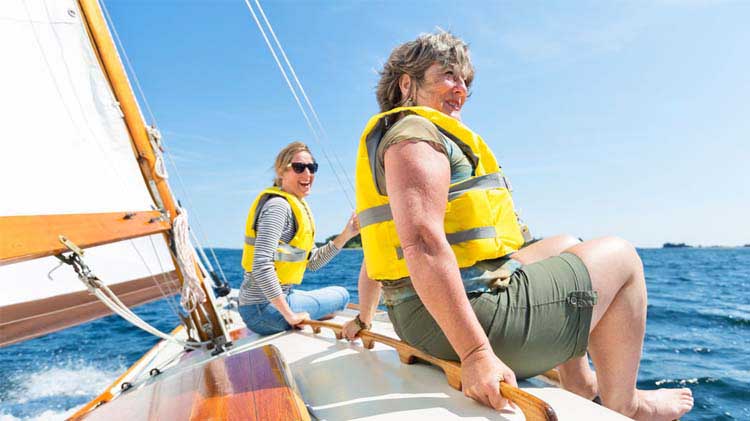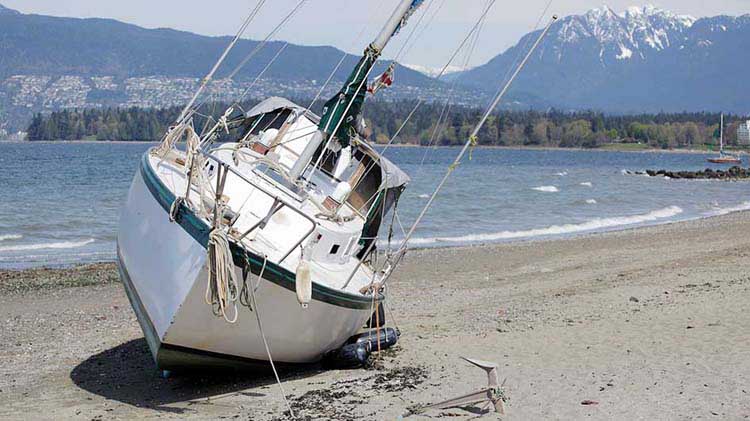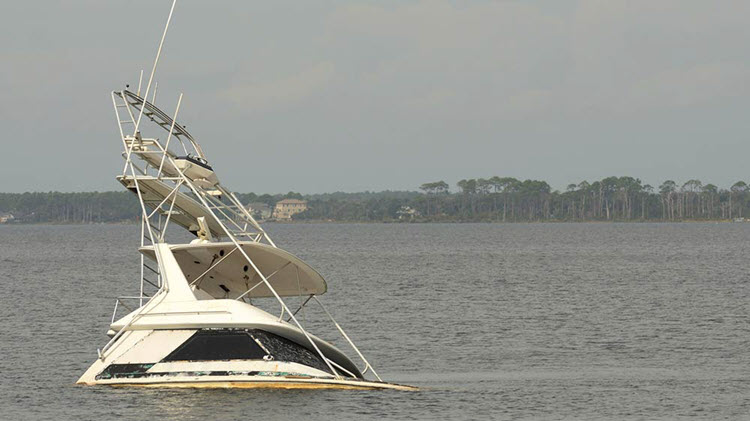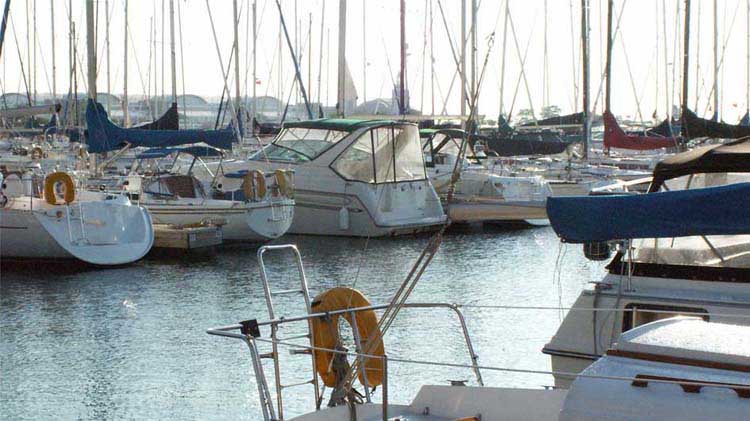Boat trailer safety
Towing a boat safely requires choosing the proper trailer and vehicle, hitching it securely and following safe driving practices.
Boat trailer safety is often overlooked but can be crucial for staying safe on the road and at the launch ramp. Proper towing practices may help protect your boat and trailer from damage and can help prevent accidents and satisfy legal requirements. Before heading to your favorite waterway, take a moment to learn about boat safety and review safety guidelines to help with a more smooth and secure towing experience.
How to choose a boat trailer
Boat towing safety begins by choosing the proper trailer for your boat. A boat and trailer should be compatible in weight, size and type. Most trailers have a capacity plate that lists the Gross Vehicle Weight Rating (GVWR). Check that your boat trailer has a capacity greater than your total load; ideally, your boat, fuel, gear and accessories shouldn't exceed 80% of the weight of your vehicle's max towing capacity. Overloading your trailer can lead to mechanical failures that could result in unsafe driving conditions.
There are various types of trailers to choose from like bunk trailers, roller trailers, float-on trailers, keel rollers and rib rollers.
- Bunk trailers rely on padded beams to support the hull.
- Roller trailers use rolling mechanisms, making launch and retrieval easier.
- Float-on trailers are ideal for loading and unloading a boat in deeper water.
- Keel rollers are designed to support a boat’s keel.
- Rib rollers help support the outer portions of your boat’s hull.
Always consult your boat’s manufacturer’s recommendations to ensure the right pairing for your boat.
Recent advancements in trailer safety technology can help provide additional security and convenience, such as backup cameras, trailer sway control, tire pressure monitoring systems and LED lighting. Investing in these technologies may simplify your towing experience and help enhance safety.
Have an agent contact me
with a quote
Know your vehicle's tow capacity
As with your trailer, your vehicle and its hitch should be rated to handle the tow load, and the hardware on the trailer and hitch must match. Check your vehicle owner's manual for towing information for Gross Axle Weight Rating (GAWR) and GVWR. If you have other questions, your vehicle or trailer manufacturer may be able to help you determine whether your vehicle and its hitch are up for the job.
Hitch up your boat trailer
Consider the following steps to help get your boat trailer securely fastened to your vehicle and ready for the road.
- Distribute gear evenly in the boat for a balanced load.
- Secure boat tie-downs to help ensure that the boat won't shift during transport.
- Lower the trailer coupler onto the hitch ball and lock the safety pin.
- Connect safety chains in a crisscross "X" pattern to the frame of the towing vehicle.
- Connect the trailer lighting cable to the vehicle.
- Check for proper vehicle and trailer tire pressure.
- Verify that all fasteners are properly tightened.
Maintenance tips for your boat trailer
Regular maintenance can help keep your boat trailer safe and in good condition. Boat trailers are exposed to freshwater/saltwater, road grime and frequent wear, which can impact the mechanical components. Review boat maintenance tips and consider the following to help maintain your boat trailer.
- Rinse after each use — rinsing your trailer with clean water after a trip can help remove debris, dirt, and prolong the life of the metal parts.
- Grease wheel bearings — wheel hubs are prone to failure if bearings are not regularly greased. Use marine-grade grease to help protect against corrosion.
- Brake inspections — the trailer’s brakes should be checked for wear and tear, especially if you frequently tow heavy loads.
- Lighting and wiring — test your trailer lights, turn signals and brake lights every time you tow to help ensure visibility on the road.
- Check tire pressure — verify the tires are inflated to the manufacturer’s recommended PSI.
Drive safely while towing your boat
Towing a boat and trailer requires special driving techniques to help avoid collision. Before taking to the open road, consider practicing in an empty parking lot and light traffic. While you're there, practice backing up (especially before hitting the boat ramp). Handling a loaded trailer is very different from driving a regular vehicle. Consider these safe driving tips:
- Use extended side-view mirrors.
- Watch for vehicles that may quickly come up behind you.
- Allow for extra wide turns and take corners carefully to help avoid curbs or hitting objects.
- Give yourself more distance to brake especially on inclines or declines.
- When backing up, place your hands on the bottom of the steering wheel to help provide more control.
- When large trucks pass you, take your foot off the gas to help minimize buffeting.
- Readjust the trailer's tongue weight if you notice excessive swaying.
- Check your trailer's wheel hubs at every stop. If they are hot, your bearings may need to be serviced.
Launch and retrieval tips
Boat and trailer safety doesn’t stop once you’ve reached your destination. Proper launch and retrieval techniques can help prevent accidents at the ramp.
- Pre-ramp preparation — move to a staging area to remove straps, secure the drain plug and load any boating equipment before approaching the ramp. This can help keep the process efficient and prevent traffic jams.
- Launching down the ramp — back your trailer down the ramp and into the water slowly and steadily. Consider using spotters if you don’t have a clear view.
- Retrieval — use the winch to pull the boat onto the trailer steadily, ensuring it is properly centered. Re-secure the safety chains and check everything before leaving the ramp. Once you’ve pulled away from the ramp, reattach the tie-downs so that the boat is properly fastened on the trailer.
Boating safety laws
Like road safety laws, boat trailer safety goes hand in hand. Most states enforce trailer regulations such as maximum weight restrictions, lighting visibility and the use of safety chains. Review the state-specific laws for your state and anywhere you may take the boat. Also, consider completing a boat towing safety course, which covers topics such as defensive driving, hitching and unhitching and weight-distribution principles.
Emergency preparedness while towing
Even with preparation, emergencies can happen on the road. To help stay ready for unexpected situations, equip your vehicle with an emergency kit containing the following:
- Spare tire for the trailer
- Tire jack and lug wrench
- Flares or reflective triangles
- Extra boat trailer safety chain
- Basic tools for repairs like screwdrivers and wrenches
- First-aid kit
Before you take your boat on the water, talk to a State Farm agent about coverages for your boat.
